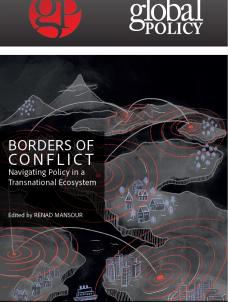
Armed conflicts are rarely confined within country borders. Flows of power, capital, services, and people connect conflicts to distant geographies. Even local or intra-state wars are symbiotically linked to transnational political, economic, ideological and military dynamics, both influencing and being impacted by neighbouring powers and those further afield. Edited by Renad Mansour, this e-book focuses on transnational conflict in the Middle East and Africa, where the geographical borders between nation-states are porous and the institutional borders between state and non-state are blurred.
The nine essays consider the transnational dynamics of authority and violence to explain how an armed conflict in one locality exists in a transnational ecosystem that connects distant geographies. This has significant implications for the country-centric policy frameworks that predominantly characterize the Global North's engagement with the Middle East and Africa. Diplomatic strategies, such as political settlements, alongside security measures like border fortification and the imposition of sanctions, tend to be narrowly focused on nation-states and formal government institutions. This approach often overlooks the intricate interconnections of power and violence that transcend these boundaries. In contrast, adopting a conflict-centric perspective that begins to delineate the parameters of the transnational conflict ecosystem can provide a more effective foundation for formulating conflict responses.
To download the free e-book for popular readers or as a PDF, please see below.
Contents
1. Introduction: The Transnational Conflict Ecosystem – Renad Mansour
2. Why Jihad Goes Local: Mechanisms Behind the Transnational Spread of Militant Ideologies– Raphael Lefevre
3. Chequered value chains: globalisation made in the borderlands- Max Gallien
4. Contested authority in a disputed land: the role of the Welkait Committee in Welkait/Western Tigray- Alemu Asfaw Nigusie, Ahmed Soliman
5. Port infrastructure and state-building in the Horn of Africa– Jutta Bakonyi and May Darwich
6. Trading 'tomatoes' in Iraq – Renad Mansour
7. Violent conflict in Libya – Tim Eaton
8. Continuum of violence and transnational conflict response – Leah de Haan
9. Mapping conflict in contemporary supply chains – Deborah Cowen